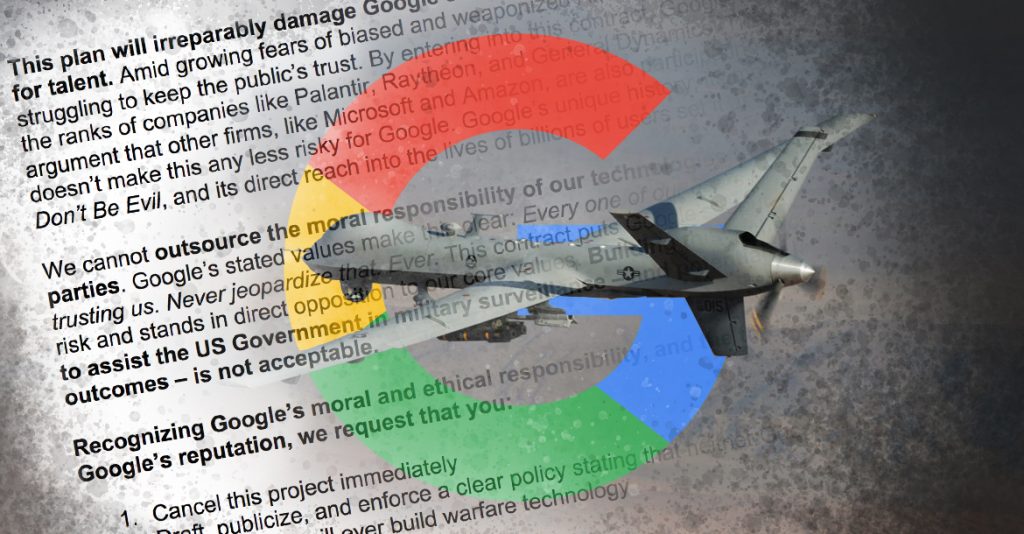
Workers Protest Drone Tech in letter to Google CEO
According to original reporting by the New York Times, Google employees have taken a stand against their company in the wake of controversial revelations last month that the company is actively partnering with the Pentagon to provide what Google describes as strictly “non-offensive” open-source image classification AI to assist in identifying objects in drone footage.
Citing Google sources who spoke to the press anonymously fearing internal repercussions, an open letter to CEO Sundar Pichai is actively circulating within the company and has acquired more than 3,100 signatures over the course of “several weeks.” The signatories include dozens of senior engineers. Obtained by the NYT (pdf here), the letter expresses concerns by employees that Google’s involvement with the military violates the company’s core values, offends some employees’ deeply-held ethical principles and could harm Google’s reputation and abilities to recruit new talent.
Subcontracted as part of the Department of Defense initiative Project Maven to “accelerate DoD’s integration of big data and machine learning,” Google’s AI technology in question will improve object recognition in drone footage. According to the company, Google’s Project Maven AI can not only identify objects in drone feeds, but is also able to “flag images for human review,” capabilities the company says are designed “to save lives and save people from having to do highly tedious work.”
Proponents of the project believe it will improve the combat effectiveness of U.S. troops—perhaps even lessening collateral damage—by improving the accuracy of surveillance collections and streamlining analysis of such footage.

A protester at Google HQ in 2010 quoting the company’s famous motto. Via Steve Rhodes/flickr/cc
Google executives were in full damage control mode following wide mainstream coverage of Project Maven. They assured the public and employees that its technology uses “open-source object recognition software available to any Google Cloud customer” and would be used solely for non-offensive, non-lethal purposes. Google’s cloud infrastructure head Diane Greene told employees that Google was not developing AI technology to “operate or fly drones” and that Google’s Project Maven products “will not be used to launch weapons.”
Concerned employees, however, aren’t assuaged by Project Maven’s stated non-combat role. The letter advocates that “Google should not be in the business of war” and demands in addition to the cancellation of Google’s DoD Project Maven contract “that neither Google nor its contractors will ever build warfare technology.”
While recognizing that Project Maven isn’t designed for lethal purposes, the letter expresses valid concern that Project Maven, once delivered to the DoD, “could easily be used to assist in these tasks over future military uses of the technology.” The employee letter stresses in no uncertain terms that “we cannot outsource the moral responsibility of our technologies to third parties” and that “building this technology to assist the U.S. Government in military surveillance–and potentially lethal outcomes–is not acceptable.”

Peter Thiel’s Palantir develops sophisticated big data and intelligence tools for government customers. Google employees worry that Project Maven or other DoD projects might put Google in similar company to Palantir, alienating customers and tech talent because of defense tech’s inherently lethal potential. Credit: Youtube
Additionally, the letter cites concerns that Google’s public reputation will be irreparably harmed by Project Maven, and that if Google—whose motto was once famously “don’t be evil”—takes on more DoD contracts, the company might be seen to “join ranks of companies like Palantir, Raytheon, and General Dynamics.” Those companies are staking their fortunes on lucrative contracts delivering defensive technologies abroad—and increasingly at home—as counterinsurgency tactics and front-line military equipment is more widely used by American law enforcement and private contractors.
While the letter notes that Google’s competitors Amazon and Microsoft have enthusiastically assumed defense contracts of their own (including, in one example provided by the NYT, an image recognition service similar to Project Maven), the other tech giants’ military affiliation “doesn’t make this any less risky for Google” and the company should “never jeopardize” the trust of Google’s employees, users and the public.







Leave A Comment